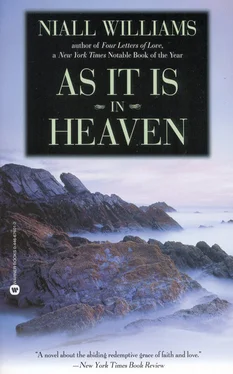Martin Moran was not the only one who let himself be haunted by their visit. Mickey Hayes, standing in his Wellingtons in the queue at the counter, saw the way the assistant manager had leant over to talk to them. He could see the look of pound notes in Moran's eyes, and craned his neck and allowed the gambling addiction of his lifetime to make him think he overheard what he most feared: another's fortune. “They've won the fucken' lotto,” he said in a cracked voice too far above a whisper for Maggie Saunders not to hear it and turn at once to watch Stephen and Gabriella walking contentedly out the door.
From that moment the word travelled like an airborne virus, so that it seemed to move and arrive in every house and business in the town as quickly as human greed. Mickey Hayes carried it to three pubs. He allowed the bitterness that life had long ago lodged in his bloodstream to inflate the terrible tale of the two, not even married, flaunting their fortune in the streets of Kenmare. Narrow-eyed and with Guinness froth moustaching him like a banderillero, he described them as walking mockeries. He said they had hidden it from everybody. They must have won the fucken' thing weeks ago and hidden themselves up in that house. Not even one drink on the house anywhere had the feckers bought, not the steam off their piss were they thinking of donating to anyone.
“That's nice carry-on, isn't it?” he asked Donal Mungovan on the stool next to him.
“Christ, but it is,” said Donal, and shook his head in slow wonder at what the hell God was up to, letting the likes of them win instead of him.
Even before Stephen and Gabriella had passed Cox's butchers midway up the town, Helena had heard. She was still bruised on her left cheek from the business in the post office and was unsure yet that her cosmetic covered it sufficiently. She stayed indoors upstairs and received callers. When Maggie Saunders told her, her heart sank. Love and money, she thought, and had to tilt her head back to stop the involuntary spasm of her tears from streaking across the covered bruise. There was a silence bitter and heavy and thick in her sitting room, where women's magazines were scattered gaudily like unfulfilled promise in an empty heart.
Then Maggie Saunders said, “Well, all can't be well in paradise.” She nodded and half-closed her eye, cocking her head at the invisible lovers. “They're not married. There's no ring.”
This seemed to console Helena Cox slightly. She went to the window and looked out across the street, to where Stephen and Gabriella were talking to Nelly Grant at the stall of cabbages. In the tender spring light even she could see the love glowing from them; it smote her like a cold iron and made her think of Francie downstairs at the butcher stall, with his dumb brutish kind of passion that subsided into nothing. With Maggie behind her, she bit on her cherry-painted lip. “I have to tell some people,” she said. “Father Dempsey will want to know.” Then she turned and walked away, lighter and suddenly eased with the plan of spreading her sourness.
By evening everyone in the town had heard. It was talk with a life of its own. By the fall of darkness people who told the tale of the lottery win could not even remember whom they first heard it from. It was a fact. New details emerged in each telling and clung to the tale like wasps in flowers. Just so came the story of how Stephen had first tried to hide the fortune from the people of Clare, how he had failed to tell his principal and simply disappeared, pretending all kinds of elaborate ruses, even inventing his own father's death, so that no one would discover the money. Gabriella was no better. She was carrying some Italian fellow's child. She had dumped him and gone off and come back only when she heard, and was now pretending the child was Stephen's. The fellow was such a fool, his own greed was so thick that he could not even see hers.
Not everyone in the town that night was bitter with envy. The German silversmith laughed and clapped; he loved to see fairy tales in Ireland, he told Helena, and his blue eyes twinkled above the mass of his beard like cloudless azure. Nolan and McCarthy & Son, undertakers and builders, took the news as a sign of the nearness of luck and bought double scratchcards; the two O'Connells, solicitors, shrugged indifference and beeped the automatic alarms of their Rovers. There were others, too, to whom the news when it reached them had the quality of grim fable, and so slipped into their lives only as a chastening reminder of how terrible money can be.
Nonetheless, from the few the sickness of greed grew. And by the time the light died on that April evening, the story of Stephen Griffin and Gabriella Castoldi had spun a kind of thick yellowish brume out of the window of O'Loughlin's and Coughlan's, and O'Siochru's pub, too, and the air was so heavily scented with the exhaled bitterness and envy that it choked the lungs and browned the stars and half obscured the moon itself, so that it hung over the town like a gouged eye.
 The following morning brown rain was falling. As if some malignancy were weeping, the water seeped off the sky from early dawn. It fell steadily and screened the mountains and made the town seem small and miserable. In his morning sermon at ten o'clock Mass, Father Dempsey scowled at the small gathering of weekday Massgoers and told them sometimes we have to feel God's Own Disapproval. Helena Cox had already told him of the illicit lovers and their fortune, and the news had arrived like acid in his stomach in the middle of his breakfast fry; why must the ways of the Unjust prosper, O Lord? he asked, and had taken some comfort when he walked out into the deluge.
The following morning brown rain was falling. As if some malignancy were weeping, the water seeped off the sky from early dawn. It fell steadily and screened the mountains and made the town seem small and miserable. In his morning sermon at ten o'clock Mass, Father Dempsey scowled at the small gathering of weekday Massgoers and told them sometimes we have to feel God's Own Disapproval. Helena Cox had already told him of the illicit lovers and their fortune, and the news had arrived like acid in his stomach in the middle of his breakfast fry; why must the ways of the Unjust prosper, O Lord? he asked, and had taken some comfort when he walked out into the deluge.
And still the rain fell. It fell heavily, like regret, and flooded gutters and drains that by mid-morning were spilling over like the eyes of new widows beyond consolation. The streets of the town were awash in brown water. That the suddenness of the deluge was part of the capriciousness of west Kerry springtime was briefly overlooked, and in half a dozen shops old men and women were already gloomily discussing the vanishing of seasons and the nearness of the end of Time.
It rained. It sheeted down all that day, and the next, and the one after that, too. It rained so hard that television cameras appeared on the streets of Kenmare to film it. It rained on the rivers that were the streets of the town and which coursed along now at the speed in which a heart can change its feelings. It rained relentlessly, until the falling of the drops themselves seemed redolent with meaning and were interpreted variously on the radio and television programmes that mushroomed on the airwaves. But none of the callers who phoned in read the gloom of the weather as Gabriella did. None of them saw it as a colder vision of Venice, as the nightmarish return of murky uncertainty and the washing away of love.
While the rain fell Gabriella stayed in her bed and suffered a new form of her old despair. Her pregnancy now brought her so low in her spirit that she had not the energy to get up. She had seen the disapproval in the face of Moran when he looked at her, and knew it to be the look of her own father, too. When two men called in Wellingtons to tell Stephen at the front door that they had heard of his lottery win and wouldn't he like to donate something to the football club, Gabriella knew at once that the town must be speaking of them and that the islanded paradise of their house was destroyed now.
“There'll be no peace for us here,” she said.
It did not matter that there were hundreds of others living around the town who, when they heard of the imagined lottery win or saw the ringless hand of Gabriella and the curve of her belly, thought nothing of it and understood and accepted that even their country was in a constant flux of change and that those notions of transgression which had made sinners of all in the past were faded now to the easier morality of only the endeavour of human goodness. To Gabriella it did not matter. The rain beat down. She could not sleep. She lost concentration and threw the chess pieces at the curtains. When Stephen tried to comfort her, she lowered her head and hit her fist into the side cushion of the couch, and hit the memories of her father in the house in the Calle Visciga, the sharp cold air of intolerance and judgment.
Читать дальше

 The following morning brown rain was falling. As if some malignancy were weeping, the water seeped off the sky from early dawn. It fell steadily and screened the mountains and made the town seem small and miserable. In his morning sermon at ten o'clock Mass, Father Dempsey scowled at the small gathering of weekday Massgoers and told them sometimes we have to feel God's Own Disapproval. Helena Cox had already told him of the illicit lovers and their fortune, and the news had arrived like acid in his stomach in the middle of his breakfast fry; why must the ways of the Unjust prosper, O Lord? he asked, and had taken some comfort when he walked out into the deluge.
The following morning brown rain was falling. As if some malignancy were weeping, the water seeped off the sky from early dawn. It fell steadily and screened the mountains and made the town seem small and miserable. In his morning sermon at ten o'clock Mass, Father Dempsey scowled at the small gathering of weekday Massgoers and told them sometimes we have to feel God's Own Disapproval. Helena Cox had already told him of the illicit lovers and their fortune, and the news had arrived like acid in his stomach in the middle of his breakfast fry; why must the ways of the Unjust prosper, O Lord? he asked, and had taken some comfort when he walked out into the deluge.









